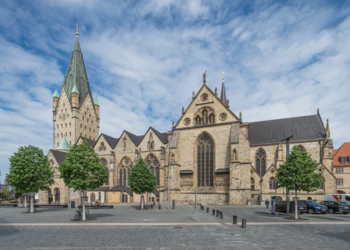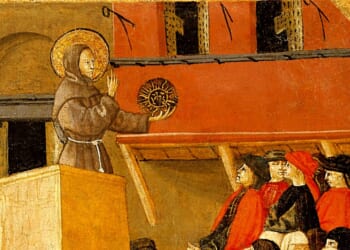One night, I went to bed mulling over in my mind a particular ongoing difficulty. It was just one of those struggles in life that does not occupy the whole of one’s day, but still, it is always there, in the background, unresolved. When resolution to a difficulty is evidently going to take time, often our human nature chooses to table it, lest we drive ourselves mad with impatience or worry. But this was one of the days I decided to pick it back up.
Very often the Lord does not infuse us with instant peace, hope, and resolution because, well, He wants us to come to Him. And not just come to Him with a please, please, please; He longs for us to “hang out” for a while. That is, He yearns for us to hang on to the refuge of His cloak where we will find our shelter from the storm. This is the whole purpose of the melancholy God allows to enter into our lives, and it differs vastly from depression and despair.
Depression and despair cause us to withdraw into ourselves and prevent us from seeing anything beyond our own pain. Melancholy keeps us searching for Jesus in a quietude of heart and mind that has nowhere else to go. In this sense, it is a good thing. It is seasonal—that is to say, temporary—and it is instructive, in that it teaches us to trust more deeply and to love more fully. So let us examine what it is the Lord wishes to teach us in our own season of melancholy, whether that season is one year, one month, one day, or even one hour.
What do you want us to do in this circumstance, Lord?
Very often the circumstances that lead up to the melancholy in our hearts have to do with a struggle we are facing in our dealings with others. And if it is with someone we love, that struggle can be extremely painful and agonizing. Friends who betray us, loved ones who leave the faith that they always knew to be true, misunderstandings, false accusations, finding ourselves to be victims of gossip, ridicule, contempt. How does one come to accept and find peace in all that? Evidently by “clothing ourselves in humility” (1 Pt. 5:5). But what exactly does that mean, and how do we do it?
St. Mark the Evangelist was born in North Africa, but then later settled in Cana of Galilee. Although he was not one of Jesus’ closest Twelve, he was one of the seventy-two other disciples who followed Jesus, and he was a relative of Peter. They were so close, in fact, that once Mark’s father died, Peter took him in as his own son.
Mark’s life indeed was blessed. The thing is: it is not how he lived that raises questions in our minds; it is how he died. It is true, those early disciples truly understood the honor of martyrdom, much more than we modern Americans embrace it in our own minds. But still. St. Mark’s martyrdom was not the “typical” brutal crucifixion, death, and burial that was the case for so many of the other martyrs who lived during the time of the Roman empire. His was a death that came about by being dragged through the streets until his body was ripped apart and torn to pieces. In other words, if there was any burial at all performed by his loved ones, it would have taken place after they’d picked up the pieces of his torn flesh from the streets. Those who loved him would not have been EMT workers accustomed to witnessing gruesome scenes, aided by mental health counselors to work through their post-traumatic stress. Mark’s loved ones would have suffered more from what they’d seen than even Mark himself, whose death we can only hope was swift.
So what does this have to do with our learning to be humble in our difficult circumstances? It is this: humility tells us that our difficult circumstances are not about us. They are about something much bigger than ourselves: that something is love. How else could Mark—or any of the other early Christians for that matter—have faced their martyrdom confident and unafraid? They knew that “God opposes the proud but bestows favor on the humble” (1 Pt. 5:5), and that even though all might have seemed lost at that moment, the Lord would indeed bestow favor, even if they could not see how that could be from their perspective. After all, tied to a chariot in the moments before his execution, it is unlikely Mark imagined that God’s “favor” would come in the form of a last-minute rescue. He knew this was the end for him. The “favor” bestowed upon him was the grace to face death with total peace.
While indeed peace was the great favor bestowed upon Mark personally, the favor bestowed on the rest of humanity as a result of his writings is beyond measure. Mark was one of just four people to have recorded the life of Christ so that the generations to come could be fed by his word. Because of Mark, we can sit with Jesus every day in the safe haven that His holy word.
Author’s Note: Excerpt from The Safe Haven: Scriptural Reflections for the Heart and Home (Season of Easter). To purchase, visit Amazon or The Catholic Company, where all other volumes currently in print are also available.
Photo by Kinga Howard on Unsplash
















